Home → Programs & Resources → Educational Programs → Teachers & Educators → Curriculum and Activity Guides
Curriculum and Activity Guides
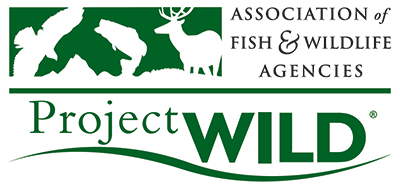
On this page:
- What is Project Wild?
- Why Project Wild?
- Who can use it?
- Which Project Wild Guide(s) is right for you?
- Want to learn more?
- Ready to Get Started? Attend a Project Wild Workshop
What is Project Wild?
Project Wild is a series of activity guides that can be used as part of any class instruction, designed for pre-K through 12th grade. The guides that are part of the Maine Project Wild suite are Project Wild (terrestrial) guide, Aquatic Wild, and Growing Up Wild. All of Project Wild is facilitated nationally by the Association of Fish and Wildlife Agencies and coordinated by an agency or organization in each state. It is the mission of Project Wild to provide wildlife-based conservation and environmental education that fosters responsible actions toward wildlife and related natural resources. Each of the individual guides has their own focus, but all are designed with hands-on, inquisitive, student lead learning in mind, and are aligned with education standards.
Project Wild activities are designed to assist learners of any age in developing awareness, knowledge, skills, and commitment to result in informed decisions, responsible behavior, and constructive actions concerning wildlife and the environment upon which all life depends.
To learn more visit www.fishwildlife.org/projectwild
Why Project Wild?
In this ever-growing world and changing climate we are all faced with decisions and information about how humans affect wildlife and wild places. As educators we feel a need to help our students be a part of and understand the world they live in. Project Wild provides activities to help develop critical thinking skills as well as gain knowledge about wildlife and habitats, and to help make wise decisions that affect the life and use of our natural resources. In Project Wild learning is done through hands-on activities, projects, and games. It is a great way to learn about local wildlife.
Each of the guides helps incorporate wildlife and ecological concepts into any class curriculum, and each activity is designed to/with
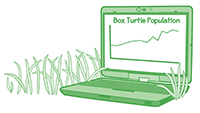
- Provide hands-on, interdisciplinary activities
- Support learning in formal & non-formal educational settings
- Align with learning standards
- Scientifically accurate materials
- Provide an emphasis on outdoor learning and field investigations
- Service-learning opportunities
- Conservation career and occupation connections
- STEM applications
- Educator training workshop applications
Who can use it?
Anyone can use Project Wild guides, and there are several guides to choose from - Project Wild, Aquatic Wild, and Growing Up Wild.
Teachers, parents, scout leaders, and other organizations and community groups will find that these activity guides are useful and easy to use. Activities are aligned with education standards (NGSS, Head Start Early Learning Outcomes Framework, CCSS, and some scout badges). There are also suggested community science uses as well as connections to climate change education.
Learn more about Project Wild resources
Which Project Wild Guide(s) is right for you?
There are several types of activity guides in the Project Wild suite, and here are the three that Maine Department of Inland Fisheries and Wildlife currently offer trainings on through our partner organizations and volunteer facilitators.
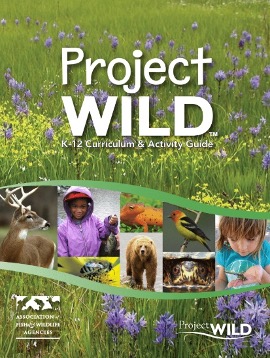
Project Wild K-12 Curriculum and Activity Guide is a wildlife education program focused on terrestrial wildlife, habitat, and ecological concepts. Contains over 100 activities fostering learning about and responsible action towards wildlife and natural resources.
Learn more about Project Wild
(only available through a workshop)
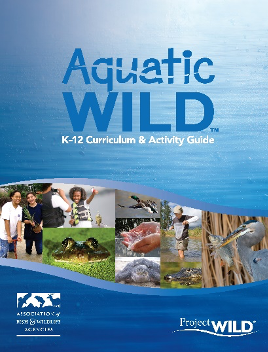
Aquatic Wild K-12 Curriculum and Activity Guide is a wildlife education program focused on aquatic and wetland wildlife, habitats, and ecological concepts. Contains over 50 activities with an emphasize on gaining knowledge about and responsible action towards aquatic wildlife and water resources.
Learn more about Aquatic Wild
(only available through a workshop)
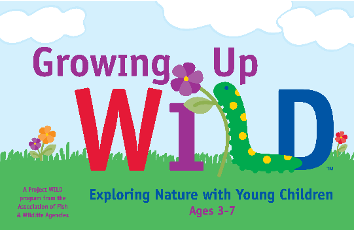
Growing Up Wild: Exploring Nature with Young Children is an early childhood education program that builds on a child’s sense of wonder about nature and invites them to explore wildlife and the world around them. There are over 20 activities that are specifically designed for children ages 3-7. These lessons can be used in pre-schools, child development centers, and kindergarten classrooms.
Learn more about Growing Up Wild
(available through training workshops or purchase online)
Want to learn more?
Visit Project Wild’s website to learn more about the different programs and resources available about Project Wild and to purchase materials.
Also check out Project Wild on social media
Social Media
Project WILD maintains the social media pages below, where we post wildlife-related and environmental education resources, articles, photos, and ideas for incorporating WILD activities into our followers’ educational settings. The national office encourages you to send us events or items of interest for us to share!
AFWA staff emails can be found at https://www.fishwildlife.org/contact/afwa-staff-contacts.
General Project WILD inquiries can be directed to projectwild@fishwildlife.org.
To schedule or sign up for a workshop please fill out this Workshop Request Form.
Ready to Get Started? Attend a Project Wild Workshop
Workshops currently offered in Maine are for Project Wild (terrestrial), Aquatic Wild, and Growing Up Wild. Each workshop is led by a trained facilitator and all participants will get to:
- Take a tour of the selected guide(s) and how to use the many features
- Participate in a wide array of WILD activities and discussions.
- Be provided with hands-on WILD experience with interdisciplinary activities
- Lead and organize activities in small groups
- Discuss and receive assistance with integration of activities into their curriculum(s)
- Learn about Maine wildlife species and natural resources as it pertains to the activities
- Go over additional online resources provided by MDIFW and Project Wild
Project Wild and Aquatic Wild are only available through workshops but Flying Wild and Growing Up Wild you can buy online often at a slightly higher cost than a workshop book price. Often the price of a single book online is more expensive or about the same as attending a training workshop. At a workshop you typically get the book the same day, extra materials, and hands-on training with a certified facilitator. At the completion of the workshop you will also get a certificate that can be used toward your professional development credits.
Who teaches training workshops and who can attend?
Wild workshops are conducted on a statewide basis by trained facilitators. Workshops may be scheduled year-round at a variety of locations.
Teachers, scout leaders, educators, non-formal educators, college students, camp leaders, child care providers, parents, after school providers and more are all encouraged to attend or schedule a workshop.
A workshop can be scheduled for an entire school district, an individual school, as a part of college courses, at conferences, on in-service days, professional days, early-release days, weekends, during vacations, and for other community groups as well.
Wild workshops are designed so educators can become familiar with the activities and their multidisciplinary uses. Each workshop does have a fee for materials and books of around $25-$50 per participant, longer, more complex workshops may have higher fees. Please let us know if the fee is an obstacle for you or your group.
Types of Workshops:
- Basic - Training for one of the activity and curriculum guides for about 10-30 people.** This training will go over a handful of activities, review the guide format, take a look at available resources, and provide participants who complete the course with a book and certificate of completion. This workshop is 3-8 total hours and can be adapted to one or two sessions. Length depends on which guide you choose.
- Project Wild K-12 Curriculum and Activity Guide - 6-8 hours*
- Aquatic Wild K-12 Curriculum and Activity Guide - 6-8 hours*
- Growing Up Wild: Exploring Nature with Young Children - 3-6 hours*
- Combo workshop - Combine two activity and curriculum guides into one training and become certified in both by the end. Pick any of the two we offer (Project Wild, Aquatic Wild, or Growing Up Wild). We will go through activities from each and discuss how each can fit together or alone into your curriculum. This workshop varies in length depending on which guides you choose. Typically, 6- 10 hours* and may be able to spread across more than one day if necessary. Training is for about 10-30 people.**
- Advanced Workshop or Special Topics – This workshop is designed to dive deeper into the guides or focus on specific topics or issues. Topics can address specific species, i.e. bats, bears, food chains, climate and environmental changes, seasons, etc. and can be an extension of a basic workshop or as a standalone. Curriculum guide books are only provided if a basic activity and curriculum training is included. Sample activities may be used for training purposes, but full lesson plans are only provided if basic training is included or has been taken previously. Cost and times vary depending on options. Typically, these are full day trainings and may be more than one depending on needs and availability. * Training is for about 10-30 people.**
- Joint workshops – Working with other agencies and organizations we can provide a training for more than just Project Wild activity and curriculum guides. You can combine a Project Wild workshop with either a Project Wet or Project Learning Tree activity and curriculum guide. Typically, 8- 10 hours and you will receive a certification for each guide. * Training is for to 10-30 people.**
*These are minimum qualifications, but we can be flexible to meet the needs and availability of educators to attend these professional development workshops/ trainings.
** If you can’t fill a workshop, we can open it up to the public as well.
To book a workshop or sign up for one, please fill out this Workshop Request Form.
If you have additional questions about Project Wild in Maine please reach out to the Maine State Project Wild Coordinator and MDIFW Education and Outreach Supervisor, Laura Craver-Rogers at laura.craver-rogers@maine.gov or 207-592-0750.